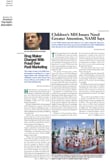Clinicians who treat women diagnosed with nonaffective psychosis during pregnancy typically prescribe antipsychotic medications for them. However, there is little reliable research evidence indicating whether this practice is safe.
A recent systematic review by the Cochrane Collaboration found no large, randomized, controlled trials (RCTs) of antipsychotic medication in women diagnosed with nonaffective psychosis.
The Cochrane Collaboration consists of 50 international research groups that conduct systematic reviews of health care interventions to help people make well-informed decisions, according to a press release. RCTs are the standard protocol used in its reviews.
“This lack of evidence raises questions regarding the appropriate management and treatment of an already vulnerable group of women and children,” stated lead author Roger Webb, Ph.D., a research fellow at the Centre for Women's Mental Health Research at England's University of Manchester.
Side Effects Affect Mother and Baby
Webb told Psychiatric News that side effects of antipsychotics affect both the mother and her baby and can result in pregnancy complications, birth defects, and neurobehavioral problems.
“Clinicians need a clear picture of the potential harms and benefits associated with these drugs if they are to be confident in prescribing them,” Webb said.
The main reason RCTs aren't conducted in pregnant women is that “they would be viewed as unethical,” said Webb.
Postpartum disorder expert Laura Miller, M.D., told Psychiatric News, “The main ethical issue for me would be the risks associated with untreated psychosis in the control group. These include denying or not recognizing they are pregnant, refusing prenatal care, and harming the fetus,” said Miller. She directs the women's services division in the department of psychiatry at the University of Illinois at Chicago and edited the 1999 book Postpartum Mood Disorders, published by American Psychiatric Publishing Inc.
Miller continued, “Untreated psychosis can also lead to a precipitous delivery without medical attention.”
Jeffrey Lieberman, M.D., a schizophrenia researcher and professor of psychiatry at the University of North Carolina, told Psychiatric News, “Trials involving women of childbearing age and pharmacologic agents raise the bar of scrutiny in the United States. An institutional review board would first want to see data that the drug was safe and effective in women of childbearing age who weren't pregnant. However, pharmaceutical companies typically don't conduct medication trials in women of childbearing age out of fear that if they become pregnant during a study and birth defects result, they will be sued,” said Lieberman.
“A methodological barrier is finding a large enough sample of women with nonaffective psychosis to conduct a randomized, multisite trial,” he said.
An estimated 2 percent of women aged 16 to 44 in the general population in England have a diagnosis of nonaffective psychosis. A subset of these women, estimated at 40 percent, is diagnosed with schizophrenia, Webb said.
Preventing Relapse
While few women with a family history of affective disorders commit infanticide, well-publicized tragic incidents, such as the Andrea Yates case, underscore the need for studies on the effectiveness of antipsychotics and mood stabilizers in preventing relapse during pregnancy, delivery, and lactation, Lieberman said.
Yates was convicted of drowning her five young children in a bathtub and is serving a life sentence in prison in Texas. A letter of appeal argues that Yates suffered from postpartum psychosis and was delusional at the time she drowned her children.
Miller prescribes antipsychotics for pregnant women, but tries to minimize the risk of birth defects by lowering the dose of medication and minimizing or eliminating environmental triggers of psychosis.
For example, her staff may have unwittingly provoked a delusion in a pregnant patient by asking her constantly about the unborn baby. The patient became jealous of the attention paid to her fetus and, in her delusional state, thought it was the devil and was stealing her nutrients. She began eating too fast and throwing up her food and losing weight.
“I asked the staff to make a point of asking this patient how she was doing, and the delusion faded,” said Miller. “It's important to work with patients in a multifaceted way.”
An abstract of the Cochrane review, “Antipsychotic Drugs for Non-Affective Psychosis During Pregnancy and Postpartum,” is posted online at<www.update-software.com/abstracts/AB004411.htm>.▪
